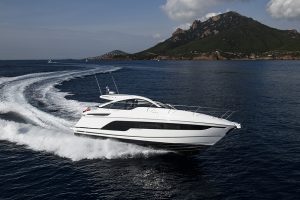Marlow Ropes launches mooring rope made of 100% recycled plastic
Marlow Ropes' Blue Ocean Dockline is made of rPET yarns and is available in the UK now. It will be launched in the rest of Europe in 2019
Marlow Ropes has launched a sustainable mooring rope made of 100% recycled plastic.
Each metre of 16mm Blue Ocean Dockline uses recycled polyester (rPET) yarn wholly made from seven and a half plastic bottles. It is available pre-spliced in 12 mm and 16 mm diameters from 6m to 15m long. The Blue Ocean Dockline is exclusive to Marlow’s mooring series and is available on the UK market now, whilst in the rest of Europe it will be available in 2019.
The construction of the recycled rope has the same attributes of Marlow’s other mooring products including good abrasion resistance and shock absorption with soft and supple flexibility and zero strength loss or shrinkage.
rPET yarns use 94 percent less water than oil-based PET fibres. The production process uses 60 percent less energy and there is a 32 percent CO2 emissions reduction. These yarns are then woven on site in Sussex at Marlow Ropes’ manufacturing operation to create the Blue Ocean Dockline – 100% up-cycled plastic and fully waterproof.
Jon Mitchell, MD of Marlow Ropes said: “Virtually every piece of plastic ever made still exists in some shape or form — unless it’s been incinerated. So re-using something as available as plastic water bottles curbs discards, reduces toxic emissions from incinerators, diverts waste from landfills, and, of course, requires fewer resources overall to be made — so that one-time purchase of a water bottle may stay useful, and stay in circulation, for many years to come.
“Like many progressive organisations, we are extremely conscious of our environmental impact and ensure that our manufacturing and waste management systems are in line with our environmental policy. All our manufacturing waste yarn is recycled where it can be, and this includes HMPE, polyester, nylon and aramid fibres. Off-cut ropes are donated to local schools and animal charities, and we have recycling policies across all other waste materials such as cardboard, wood and metal.”
For more information click here.
London’s first Seabin is installed in the docklands
The fourth Seabin in the UK has been installed in the London's docklands to tackle litter and plastic pollution in…
Eco boat charter La Bella Verde introduces an all-new solar-powered catamaran
Ibiza based chartering company La Bella Verde has introduced Ukulele, a new solar-powered catamaran available to hire or buy
Court of Justice of the European Union ruling could end the use of red diesel for private pleasure craft
A decision by the Court of Justice of the European Union could mean that private pleasure craft in the UK…












